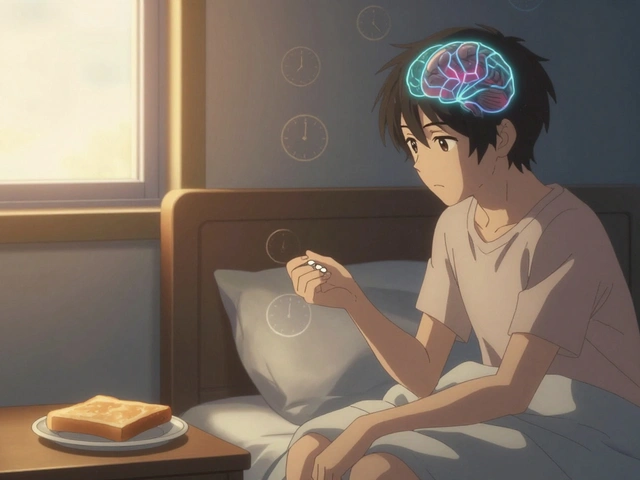Dealing with Premenstrual Dysphoric Disorder (PMDD) can be a rollercoaster, and if that's not enough, add sleep issues to the mix. Many women find that PMDD doesn’t just mess with their mood but invades their rest, too. We’re talking sleepless nights or the feeling that you could nap for days.
What’s happening here? PMDD is a severe form of premenstrual syndrome that triggers both emotional and physical symptoms, and disrupted sleep is a common complaint. Understanding why PMDD affects your sleep could be your first step towards better nights.
If you’re fighting an uphill battle with sleep due to PMDD, you’re not alone. This article tackles why PMDD and poor sleep are such a notorious duo, and more importantly, what you can do about it. From hormone fluctuations to stress, several factors play a role. But, don’t lose hope—some practical tips could help you catch those elusive Zs.
- Understanding PMDD
- Symptoms and Diagnosis
- Sleep Disruption Explained
- Managing Sleep Quality
- Lifestyle and Wellness Tips
Understanding PMDD
So, what is Premenstrual Dysphoric Disorder (PMDD), and why does it feel like such a big deal? If you’ve ever heard of PMS, imagine PMDD as its much fiercer cousin. While PMS might involve some mood swings or cramps, PMDD ramps it up to eleven, throwing intense emotional and physical symptoms into the mix.
At its core, PMDD is a severe mood disorder that's directly linked to the menstrual cycle. Symptoms typically pop up a week or two before menstruation and can include anything from extreme irritability and anxiety to debilitating sadness. It affects somewhere between 3% to 8% of women of reproductive age, which is more common than many realize.
Why Does PMDD Happen?
The exact cause of PMDD is still a bit of a mystery, but experts think it's tied to hormonal changes. During the luteal phase of the menstrual cycle, which is when PMDD symptoms show up, there’s a natural dip and rise in hormones like estrogen and progesterone. For those with PMDD, these fluctuations might trigger abnormal serotonin responses, the brain chemical that helps regulate mood.
Getting Diagnosed
If you suspect you have PMDD, getting a proper diagnosis can be a game-changer. This usually involves tracking symptoms over a few cycles to see if they're consistent. Just like any other health issue, a good chat with your doctor is a must. They might ask you to fill out symptom diaries or questionnaires to nail down exactly what’s happening.
Understanding your own experience with PMDD is crucial, not just for finding relief, but also for sorting out how it’s affecting things like your sleep quality. Remember, help is out there, and shedding light on what PMDD is can be the first step towards taking control.
Symptoms and Diagnosis
You might be wondering if your monthly ordeal is just bad PMS or something more serious like Premenstrual Dysphoric Disorder (PMDD). The difference isn't just about intensity—it's the way it disrupts daily life. So, what are we looking for in terms of symptoms?
Common Symptoms
With PMDD, symptoms typically pop up a week or two before your period and start to fade once it begins.
- Severe mood swings, like feeling on top of the world one moment and utter despair the next.
- Irritability that’s way beyond the usual grumpiness.
- Anxiety or tension that makes it hard to chill.
- Depression, feeling hopeless, or thoughts of self-harm.
- Fatigue or feeling just plain worn out.
- Sleep problems—either insomnia or needing ten hours of shut-eye, but still feeling drained.
- Physical symptoms like bloating, breast tenderness, headaches, or joint pain.
Getting a Diagnosis
Getting a proper diagnosis involves more than just talking to your doctor about the symptoms. You might need to track them over two menstrual cycles to highlight the pattern and severity.
- Keep a detailed symptom diary. Note when they start, how severe they feel, and any impacts on work or personal life.
- A healthcare provider will review this info and might order tests to rule out other conditions.
- Diagnosis often requires meeting specific criteria laid out in mental health guidelines.
Remember, getting help is crucial. PMDD is a recognized disorder, not something you have to suffer through alone.

Sleep Disruption Explained
So, let’s talk about why PMDD can make your sleep go haywire. It’s more than just an inconvenience—these disruptions can seriously impact your day-to-day life.
Why Sleep Gets Off Track
Hormones are usually the culprits here. The drop in estrogen and progesterone right before your period starts can play havoc with your sleep. It’s like a sudden imbalance that throws your body’s natural rhythm out of sync.
But hormones aren’t the only factors. Stress and anxiety, which often spike due to PMDD, can ramp up your adrenaline levels. And guess what adrenaline does? It keeps you alert when you just want to snooze.
The Big Sleep Issues
- Insomnia: You might find yourself tossing and turning, unable to drift off.
- Hypersomnia: On the flip side, you could feel like hibernating, sleeping more than usual without feeling refreshed.
- Fragmented Sleep: Even if you do sleep, it’s not the good stuff where you wake up feeling crisp and ready to go.
If you’re dealing with these issues regularly, it can affect your focus, mood, and overall health. It’s a bit of a vicious cycle—poor sleep can make PMDD symptoms worse, and worse symptoms make sleep even harder to come by.
Statistics to Ponder
If numbers tell a better story, here’s one: nearly 70% of women with PMDD report serious sleep problems during their luteal phase. That’s no small matter.
| Symptom | Percentage of Affected Women |
|---|---|
| Insomnia | 35% |
| Hypersomnia | 20% |
| Fragmented Sleep | 30% |
Understanding these disruptions can be the first step in taking back control over your sleep, paving the way for better nights and brighter days.
Managing Sleep Quality
Struggling with sleep because of premenstrual dysphoric disorder can feel like a never-ending cycle. But here’s the good news: there are ways to tweak your routine that might just make a difference.
Pay Attention to Your Sleep Space
Your bedroom should be the most relaxing spot in your home. Keep it cool, dark, and quiet for optimal sleep conditions. Investing in blackout curtains and white noise machines can make a big difference. And seriously consider keeping electronics out of the bedroom—they can be too engaging right before bed.
Keep a Consistent Sleep Schedule
Your body loves routine, even if your brain sometimes doesn’t. Try your best to go to bed and wake up at the same times every day, even on weekends. This aligns your internal clock with the natural day-night cycle, potentially easing sleep disruptions caused by PMDD.
Watch What You Eat and Drink
Caffeine and sugar can be pitfalls. Consuming these too close to bedtime might keep you tossing and turning longer than you’d like. Try steering clear of caffeine after lunchtime and opt for herbal teas or water in the evening instead.
Relaxation Techniques are Your Friend
Nighttime anxiety is a major sleep quality buster. Incorporating relaxation exercises such as deep breathing, meditation, or progressive muscle relaxation into your routine can quiet that pre-bedtime stress.
Monitor Your Exercise Routine
Regular physical activity has been shown to improve sleep quality, but timing is essential. Aim to finish vigorous workouts at least a few hours before hitting the hay to give your nervous system time to wind down.
Sometimes it takes a bit of trial and error to crack the code to better sleep. But understanding how PMDD affects your rest and taking small, actionable steps can lead you toward more restful nights. Patience is key, and if these tips don’t seem to help, consulting a healthcare provider could be the next step.

Lifestyle and Wellness Tips
Navigating premenstrual dysphoric disorder, especially when it's impacting your sleep, can sometimes feel overwhelming. But there are some real, actionable steps you can take to improve the situation. Let's look at some practical life changes and wellness tips that might help.
Keep a Consistent Sleep Schedule
Consistency is key. Try to go to bed and wake up at the same time every day, even on weekends. This helps regulate your body’s internal clock, making falling asleep and waking up much easier.
Exercise Regularly
It might sound cliché, but regular physical activity can significantly improve your sleep quality. Aim for about 30 minutes a day. It doesn't have to be intense; even a brisk walk can make a difference.
Mind Your Diet
What you eat can affect your sleep. Avoid heavy meals, caffeine, and alcohol close to bedtime. Instead, focus on a balanced diet rich in fruits, vegetables, and lean proteins to help manage PMDD symptoms.
Practice Relaxation Techniques
- Meditation or deep breathing exercises can calm your mind before bed.
- Consider yoga or gentle stretching as part of your bedtime routine.
Create a Comfortable Sleep Environment
Your bedroom should be a sanctuary for sleep. Make sure it's dark, quiet, and cool. Investing in a good quality mattress and pillows can also make a world of difference.
Limit Screen Time Before Bed
The blue light from phones and computers can interfere with your body's natural sleep quality. Try putting those devices away at least an hour before you hit the hay.
By incorporating these simple steps into your routine, you might find yourself sleeping better and feeling more in control of your PMDD symptoms. Remember, small changes can make a big impact!








Ashley Helton
July 17, 2025 AT 22:21Wow, this article really hits home for me. I've experienced PMDD, and let me tell you, the sleep disruption is no joke. Like, one night I get barely any rest because of restless legs or anxiety, then the next night I'm falling asleep randomly during the day. It seriously messes with your whole schedule.
It's interesting how the article talks about lifestyle changes because I've tried cutting back on caffeine and exercising more, and it helps a bit. But honestly, some nights that just won't cut it. I wish there were more concrete solutions out there.
Does anyone else find that stress management stuff is easier said than done? Like, how do you even start when your mind just keeps racing? Curious if there are any good recommendations or if medication is the only real fix.
Brian Jones
July 19, 2025 AT 16:01Haha, absolutely right, sleep during PMDD is like trying to catch smoke with your bare hands—it just slips away no matter how hard you try!! Seriously though, the science behind how PMDD impacts neurotransmitters linked to sleep is fascinating and terrifying at once.
One thing that helps me (besides binge-watching comfort shows) is maintaining a consistent bedtime ritual—yeah, sounds cheesy but it kinda resets the brain.
And I've gotta say, managing stress is almost a full-time job when you're dealing with PMDD symptoms. It’s like, do I relax or do I prep for the next insomnia wave? The struggle is so real!!!
Carlise Pretorius
July 22, 2025 AT 19:35hey, thx 4 shining light on this its not talked bout enough imo
i get this and the nights can get rly rough i just want to sleep and rest but no its like my bruain wont let me chill
some days i feel dead tired but cant sleep, it sucks big time. any one tried cbd or natural stuff?
Johnson Elijah
July 25, 2025 AT 02:01Yo, this post is so on point! 💯 The way PMDD messes with sleep isn’t just a minor nuisance; it straight-up affects the entire flow of your day and mood. I think putting emphasis on lifestyle tweaks and stress management is the best way to empower women dealing with this.
Would love to hear everyone’s hacks — what routines or rituals do you swear by? Also, adding meditation or breath work has been a game changer for many. Let’s help each other out! 🌙✨
Roxanne Lemire
July 28, 2025 AT 06:41I read the article, and it's really insightful but I tend to think... why is it that PMDD, which disrupts so many aspects of life, gets largely swept under the rug? The connection between endocrine cycles and neurological impact is profound, yet often overlooked.
How do you guys feel about the notion of integrating hormonal therapies alongside psychological approaches? I feel like a multi-disciplinary approach might be our best bet, but there’s so much stigma attached.
Alex Mitchell
July 30, 2025 AT 20:55This post brought up some important points about PMDD that I think many people don’t fully understand. Sleep quality is critical for overall health, and when PMDD interferes with that, it creates a cascade of issues.
I’ve seen clients respond well to a combination of behavioral strategies and sometimes light therapy. It’s all about finding what fits your unique physiology and lifestyle. 🌟
Also, I really appreciate the practical tips shared here. It gives folks some actionable steps instead of leaving them feeling lost. Anyone else tried light therapy or specific sleep hygiene routines for PMDD?
Narayan Iyer
August 3, 2025 AT 08:15From a neurobiological perspective, the disruption of GABAergic and serotonergic systems during the luteal phase could explain a lot of the sleep disturbances mentioned in the article.
What fascinates me is the potential for emerging pharmacotherapies that target these pathways specifically rather than just treating symptoms broadly.
Has anyone here experimented with SSRI treatments or supplements like magnesium or tryptophan to see if they improve sleep quality related to PMDD?
Would love to get some anecdotal evidence on this!!
Amanda Jennings
August 7, 2025 AT 23:21I've been living with PMDD for a few years now, and honestly, the sleep issues are one of the hardest to manage. What works one month could completely fail the next, so it's this constant cycle of trial and error.
I try to keep a sleep diary to detect any patterns, and I swear mindfulness meditation helps more than any pill. But yeah, it can be frustrating when nothing feels consistent.
Does anyone use weighted blankets or white noise machines? Curious if others have had any luck with those.
alex cristobal roque
August 10, 2025 AT 20:48This article is a nice compact summary, but I’d love to see some in-depth discussion on the physiological mechanisms that PMDD uses to sabotage sleep architecture. For instance, alterations in REM sleep cycles through hormonal fluctuations can deeply impact restorative sleep which, in turn, exacerbates mood symptoms. It’s a vicious feedback loop.
In clinical practice, I’ve noticed that combining behavioral therapies alongside low-dose hormonal treatments often yields the best patient outcomes — but everyone’s response is so individualized.
Anyone else here working with a multidisciplinary team to tackle these issues?
Bridget Dunning
August 14, 2025 AT 08:08I found this article incredibly enlightening! It sheds light not only on the physical aspects of PMDD but also the psychological toll poor sleep quality exerts. The integration of lifestyle changes reminds me of a biopsychosocial model, which is essential when approaching such complex disorders.
How does everyone feel about combining pharmacological interventions with holistic practices such as yoga or acupuncture in the management of PMDD-related sleep disturbances?
I believe a personalized and culturally sensitive approach would best serve diverse populations.
Shweta Dandekar
August 16, 2025 AT 01:48Honestly, we should be paying more attention to how much PMDD can ruin sleep. It’s not just feeling a bit off – it’s serious and deserves proper treatment. Women should not have to suffer in silence!!!
Medication helps a lot of people, but it has to be combined with self-discipline and proper health routines. No excuses. We owe it to ourselves to pursue the best care possible.
Ignoring these symptoms only prolongs the misery!!